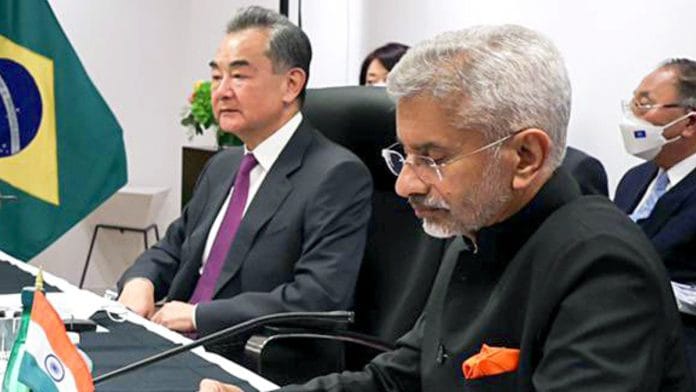New Delhi: Ahead of Prime Minister Narendra Modi and Chinese President Xi Jinping coming face-to-face at the BRICS Summit in South Africa next month, and later at the G20 Summit in New Delhi, External Affairs Minister S. Jaishankar met top Chinese diplomat and politician Wang Yi and raised the issue of border tensions between the two countries, ongoing since the Galwan clash of 2020.
The meeting was held Friday on the sidelines of the ASEAN foreign ministers’ meet in Jakarta, Indonesia, held on 11-12 July.
ASEAN is an intergovernmental organisation comprising Brunei, Cambodia, Indonesia, Laos, Malaysia, Myanmar, the Philippines, Singapore, Thailand, and Vietnam. India is part of the ASEAN Plus Six grouping, which also includes China, Japan, South Korea, New Zealand and Australia.
Jaishankar also held talks with his Canadian counterpart Mélanie Joly in Jakarta and raised the issue of the security of Indian diplomats there in the wake of threats by Sikh radicals.
Border talks in Eastern Ladakh were at the forefront of Jaishankar’s meeting with Wang, where the latter observed that both countries should find a mutually acceptable solution to border issues without letting “specific issues” affect ties.
Chinese Foreign Minister Qin Gang was scheduled to travel for the ASEAN meet, but sent his predecessor instead citing health reasons. Wang is the foreign policy chief of the ruling Communist Party of China.
Later, Jaishankar tweeted that he discussed outstanding issues related to peace in border areas but there was no further statement from the Ministry of External Affairs.
Just concluded meeting with Director Wang Yi of the Office of the CPC Central Commission for Foreign Affairs.
Discussed outstanding issues related to peace & tranquility in border areas.
Our conversation also covered EAS/ARF agenda, BRICS and the Indo-Pacific. pic.twitter.com/83VejZxUdX
— Dr. S. Jaishankar (@DrSJaishankar) July 14, 2023
Meanwhile, the Chinese Foreign Ministry issued a statement claiming India is willing to “create favourable conditions for high-level exchanges” to push the “India-China relationship back on track”.
According to Wang’s statement available on the Chinese foreign ministry website, he said, “It is hoped that the Indian side will meet China halfway and find a solution to the border issue that is acceptable to both sides.”
The two leaders also agreed to conduct the next round of military commander-level talks at the earliest.
India-China ties have been at a record low since the clashes at Line of Actual Control (LAC) in eastern Ladakh in April-May 2020. The two sides have so far held 18 rounds of diplomatic talks and have discussed proposals for disengagement in the remaining friction points in the region.
Wang also discussed Beijing’s concerns over New Delhi’s latest restrictive measures against Chinese companies conducting business in India. Since the Galwan Valley stand-off, India has banned roughly 300 Chinese apps from operating in India.
‘Canada takes its obligations seriously’
In his meeting with Joly Saturday, Jaishankar emphasised on the security of Indian diplomats in the country in the wake of threats from radical elements in Canada.
In a statement after the meeting, Joly said, “I again stressed that Canada takes very seriously its obligations under the Vienna Convention on the safety of diplomats.”
Met with @DrSJaishankar, to deepen Canada-India cooperation in line with our Indo-Pacific strategy, building on our strong people-to-people ties. I again stressed that Canada takes very seriously its obligations under the Vienna Convention on the safety of diplomats. pic.twitter.com/zeBA93vXNo
— Mélanie Joly (@melaniejoly) July 15, 2023
The two ministers also held discussions on building cooperation within the Indo-Pacific strategy as well as increasing people-to-people ties. The Canadian Foreign Minister’s statement comes roughly a week after the recent slew of threats against Indian diplomats based in Canada.
On 7 July, Sikh extremist outfits put up a poster purportedly saying “War Zone”, targeting Indian diplomats outside the Bharat Mata Mandir in Brampton in the Greater Toronto Area. They also held a protest at the Indian Consulate in the city the following day.
India has asked its allies such as Canada, the UK and the US not to give space to “extremist Khalistani ideology” as it is “not good” for relations.
Speaking to media earlier this month on the sidelines of a Bharatiya Janata Party outreach campaign in New Delhi, Jaishankar said the “radical, extremist Khalistani ideology” is not good for India and its fellow partners.
(Edited by Smriti Sinha)
Also read: Germany releases 1st ever strategy on China — not ‘decoupling’, but looking to ‘reduce dependence’






